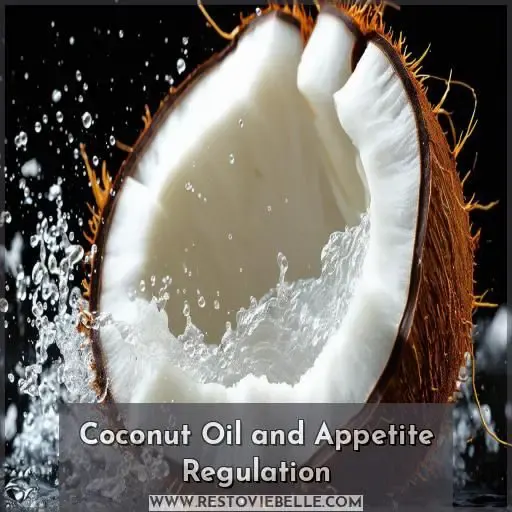This site is supported by our readers. We may earn a commission, at no cost to you, if you purchase through links.
 You’re keen to shed some pounds, and coconut oil for weight loss might just be your secret weapon.
You’re keen to shed some pounds, and coconut oil for weight loss might just be your secret weapon.
This tropical oil contains unique medium-chain triglycerides that could rev up your metabolism and make you feel fuller for longer.
While the research is still emerging, some studies show coconut oil may modestly reduce body weight and body fat percentage.
To harness its potential, simply swap it for other cooking oils – its rich flavor behaves similarly to butter.
But don’t stop there; coconut oil offers other perks too, like reducing inflammation and improving cholesterol levels.
Sound promising? Then let’s explore more ways this superfood can support your goals.
Table Of Contents
- Key Takeaways
- Coconut Oil’s Composition and Weight Loss Potential
- Coconut Oil and Appetite Regulation
- Coconut Oil and Weight Loss: the Evidence
- Using Coconut Oil Safely for Weight Loss
- Coconut Oil’s Other Health Benefits
- Frequently Asked Questions (FAQs)
- How do you use coconut oil for weight loss?
- What are the side effects of coconut oil for weight loss?
- What oil is best for weight loss?
- How do you massage coconut oil for belly fat?
- How much coconut oil should be consumed daily?
- Can coconut oil be used for cooking vegetables?
- Is coconut oil better than other plant oils?
- Does coconut oil have any negative side effects?
- Are there specific types of coconut oil recommended?
- Conclusion
Key Takeaways
- Coconut oil’s unique composition of medium-chain triglycerides (MCTs) could give your metabolism a tropical kick, leaving extra pounds stranded on that proverbial island. But the weight loss effects may be as petite as a coconut bikini, so consider it a tasty supplement to a balanced diet and exercise routine, not a miracle cure.
- This superfood contender’s potential to promote feelings of fullness is like a warm, coconutty hug for your appetite. But don’t mistake it for a hunger-squashing magic potion just yet – the research is still hashing out the details on whether it truly reigns supreme over cravings.
- While coconut oil may dethrone other fats in your kitchen and offer some promising metabolic perks, it’s not about to overthrow good old moderation as the reigning ruler of healthy habits. A few tablespoons daily is plenty to harness its potential without going overboard.
- Let’s be real – coconut oil alone won’t magically melt away those stubborn pounds. But by swapping it in as a versatile fat swap and embracing its potential anti-inflammatory, cholesterol-friendly benefits, you’re arming yourself with a tropical sidekick on your wellness journey. Just don’t forget the real MVPs: a balanced diet and regular exercise.
Coconut Oil’s Composition and Weight Loss Potential
Coconut oil is unique in containing medium-chain triglycerides (MCTs), which are easily absorbed and utilized for energy instead of being stored as fat. It’s also high in saturated fat, which has sparked debates around its potential impact on weight management.
Medium-Chain Triglycerides (MCTs) in Coconut Oil
You’ll find that coconut oil is unique due to its medium-chain triglycerides (MCTs). Here’s what makes MCTs special:
- They’re metabolized differently than long-chain fats
- Your body uses them for immediate energy production
- They may enhance weight management when part of a balanced diet
Saturated Fat Content
Though high in saturated fat, coconut oil’s unique composition offers potential benefits. Consider these key points:
- Lauric acid, a saturated fat in coconut oil, may boost metabolism
- Coconut oil may improve cholesterol levels and insulin sensitivity
- Some research links coconut oil consumption to lower body weight, BMI, and percentage of fat mass
- The saturated fat content may also provide anti-inflammatory effects
However, moderation is key, as saturated fats should make up less than 10% of your daily calories.
Coconut Oil and Appetite Regulation
You’ve likely heard claims that coconut oil can help suppress appetite and promote feelings of fullness. While coconut oil’s composition suggests it may have this potential, research on its actual appetite-regulating effects has been inconsistent.
Potential to Increase Feelings of Fullness
You’ll be thrilled to learn that coconut oil may increase fullness and help control appetite! Imagine:
- Feeling satisfied after meals, thanks to coconut oil’s fat content
- Reduced hunger pangs between meals due to slower fat digestion
- Secretion of satiety hormones like cholecystokinin and peptide YY
- Coconut oil’s fiber aiding fullness by delaying gastric emptying
Inconsistent Research on Coconut Oil’s Appetite-Suppressing Effects
Research on coconut oil’s appetite-suppressing effects is inconsistent:
- Some studies suggest it doesn’t substantially decrease hunger.
- It may be less effective at reducing appetite than olive oil or MCT oil.
- Individual differences in fat metabolism and hormonal response play a role.
- Long-term effects on calorie balance and weight are unclear.
While high in MCTs like capric, caprylic, and caproic acid, which could boost HDL cholesterol, more research on coconut oil’s impact on appetite, calorie intake, and cholesterol levels is needed.
Coconut Oil and Weight Loss: the Evidence
You may have heard claims that coconut oil can aid weight loss, but the evidence is mixed. Some studies suggest modest benefits, while others find no effect. A recent meta-analysis of 9 clinical trials found:
- Coconut oil modestly reduced body weight (0.75 kg) and BMI (0.28 kg/m2) compared to other fats.
- It slightly decreased body fat percentage (0.35%), but had no significant impact on waist circumference or fat mass.
- The weight loss effects were small and may not be clinically meaningful for most people.
- More research is still needed on coconut oil’s long-term metabolic effects and affordability as part of a balanced diet.
While coconut oil’s unique fatty acid profile shows some promise, it likely won’t lead to dramatic weight loss on its own. A healthful diet and regular exercise remain the most effective strategies.
Using Coconut Oil Safely for Weight Loss
You can safely incorporate coconut oil into your cooking by substituting it for other oils or fats. When baking or sautéing, coconut oil behaves similarly to butter, making it a versatile replacement for calorie-dense cooking fats.
Cooking With Coconut Oil
You can safely cook with coconut oil. It behaves like butter, so try:
- Sautéing vegetables in coconut oil
- Making coconut flour pancakes
- Blending coconut milk into smoothies
- Spreading coconut butter on toast
Integrating coconut products into meals is an easy way to potentially boost weight loss efforts.
Replacing Other Cooking Fats
You can replace other cooking fats like butter or vegetable oils with coconut oil. Doing so provides:
- A more diet-friendly saturated fat source with potential metabolic benefits
- Better control over your calorie intake and nutritional value
- Reduced health concerns from highly processed seed/vegetable oils
When used in moderation, coconut oil is a versatile fat swap that may support your weight goals.
Coconut Oil’s Other Health Benefits
While coconut oil may offer some potential for weight management, it’s crucial to examine its other purported health benefits. Emerging research suggests that coconut oil consumption could offer anti-inflammatory effects, boost beneficial HDL cholesterol levels, and even enhance insulin sensitivity.
Anti-Inflammatory Properties
You’ve heard that coconut oil may aid weight loss, but did you know it also boasts anti-inflammatory properties? MCTs like those in coconut oil have been shown to reduce inflammation, supporting gut health. So while incorporating coconut oil into your diet, you’re not just trimming your waistline—you’re also nourishing your body from the inside out.
HDL Cholesterol Boost
You’ll be glad to know coconut oil can boost your HDL (good) cholesterol levels. Its unique fatty acid profile promotes heart health by raising HDL while lowering inflammation and blood pressure. Plus, coconut oil aids digestion and may give your metabolism a gentle nudge.
Insulin Sensitivity Enhancement
You’ll also appreciate coconut oil’s ability to enhance insulin sensitivity. Its unique fatty acid profile may improve glucose metabolism and reduce insulin resistance, lowering your risk of metabolic syndrome and type 2 diabetes. By supporting your body’s beta cells and regulating blood sugar levels, coconut oil offers a delicious way to optimize metabolic health.
Frequently Asked Questions (FAQs)
How do you use coconut oil for weight loss?
You’re in luck – coconut oil could help with weight loss! Use it for cooking, baking, or even coffee. It’s filling and may boost metabolism. Of course, portion control and exercise are key. But a little coconut oil can’t hurt!
What are the side effects of coconut oil for weight loss?
While coconut oil is generally safe, potential side effects when using it for weight loss include digestive issues like diarrhea, increased cholesterol levels, and allergic reactions in some individuals.
What oil is best for weight loss?
Verily, the quest for the elixir of leanness is ever-changing. For weight loss, extra virgin olive oil reigns supreme due to its monounsaturated fats and potential to boost metabolism.
How do you massage coconut oil for belly fat?
Massage warmed coconut oil onto your belly in circular motions for 5-10 minutes daily. The massage helps stimulate circulation and lymphatic drainage to reduce bloating and metabolize fat more efficiently.
How much coconut oil should be consumed daily?
Whoa, don’t go chugging coconut oil by the gallon! A few teaspoons daily is plenty – about 1-4 tablespoons. Moderation’s key for any fat to avoid clogged arteries and weight gain. Small amounts can boost metabolism, but always consult your doc first.
Can coconut oil be used for cooking vegetables?
You can absolutely use coconut oil for cooking veggies! Its high smoke point makes it perfect for sautéing or roasting. Just lightly coat your fresh produce for a delicious, healthy meal.
Is coconut oil better than other plant oils?
Coconut oil isn’t necessarily better than other plant oils. It’s high in saturated fats, so use it in moderation as part of a balanced diet with plenty of unsaturated fats too.
Does coconut oil have any negative side effects?
Picture yourself enjoying a creamy, tropical delight – coconut oil can cause unwanted digestive issues like cramps, diarrhea, and fatty stools if consumed in excess.
Are there specific types of coconut oil recommended?
You’ll want to look for virgin or extra virgin coconut oil for the most benefits. Refined coconut oils lose some of their nutrients during processing. Opt for organic, cold-pressed varieties when possible.
Conclusion
Imagine cruising through your weight loss journey with a tropical superfood ally: coconut oil. Its unique MCTs could amp up metabolism and curb cravings. While incorporating it thoughtfully into your diet, don’t overlook coconut oil’s other perks like reduced inflammation. With coconut oil for weight loss, you’re revealing a versatile tool for achieving your goals.




